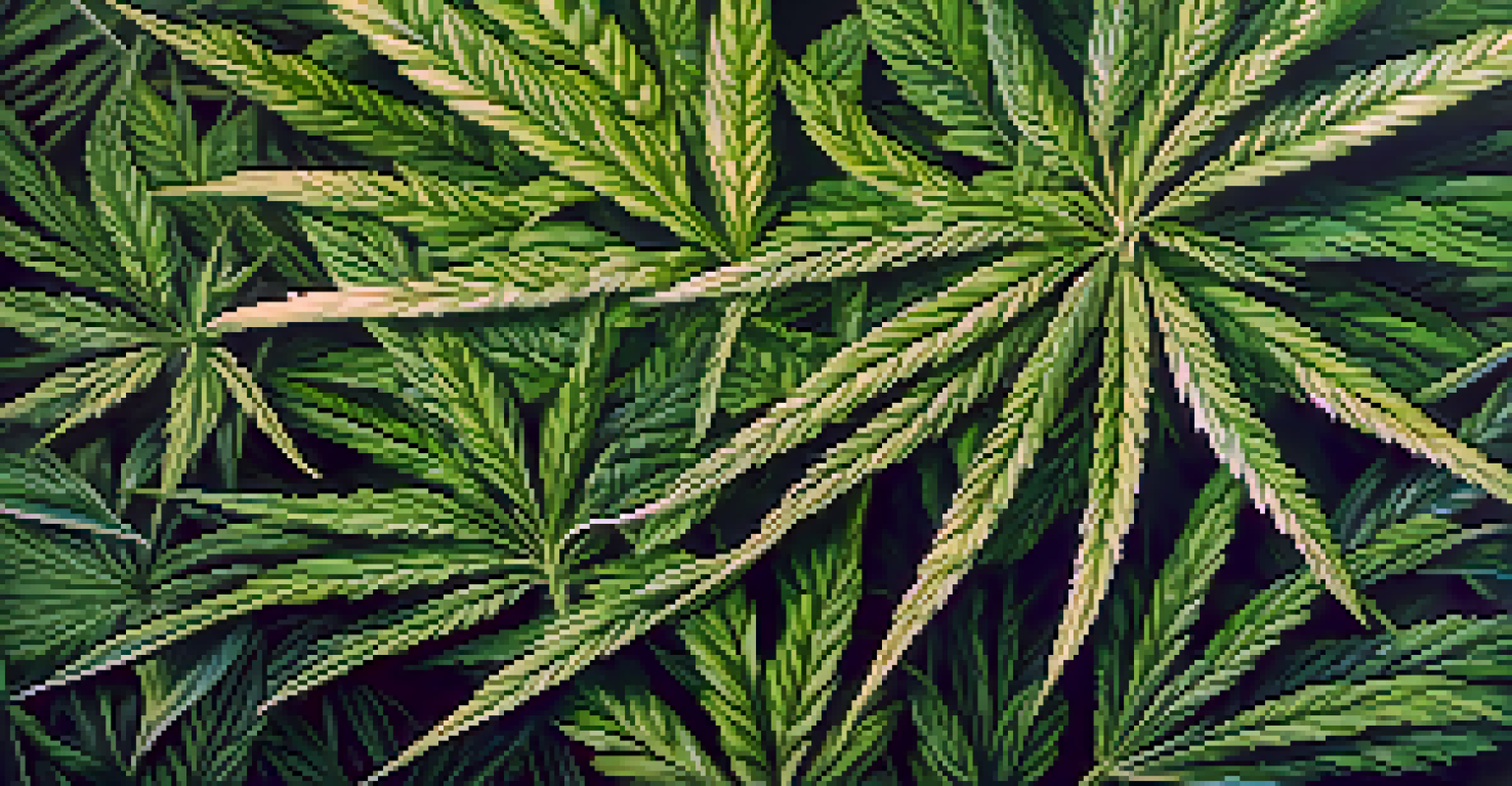Marijuana's Impact on Bipolar Disorder: What We Know So Far

Understanding Bipolar Disorder: An Overview
Bipolar disorder is a mental health condition characterized by extreme mood swings, including emotional highs (mania or hypomania) and lows (depression). These shifts can significantly impact daily life, relationships, and overall functioning. It's essential to recognize that bipolar disorder isn't just about feeling 'happy' or 'sad'; it involves complex emotional states that can be challenging to navigate.
There is no health without mental health.
Individuals with bipolar disorder often experience episodes that vary in intensity and duration. For instance, a manic episode might lead to impulsive decision-making and heightened energy, while a depressive episode can result in profound sadness and lethargy. Understanding these nuances is crucial for developing effective treatment plans and coping strategies.
As the conversation around mental health evolves, so does interest in alternative treatments, including marijuana. With many people seeking natural remedies, it's vital to explore how marijuana might interact with bipolar disorder symptoms and whether it can offer any benefits or pose potential risks.
Marijuana: A Brief Introduction to Its Components
Marijuana, also known as cannabis, contains various compounds, with cannabinoids being the most notable. The two primary cannabinoids are tetrahydrocannabinol (THC) and cannabidiol (CBD). THC is responsible for the psychoactive effects, making users feel 'high,' while CBD is often touted for its therapeutic benefits without the intoxicating effects.

Research on cannabinoids has surged in recent years, leading to increased public interest in their potential health benefits. For individuals with bipolar disorder, understanding how THC and CBD might influence mood and behavior is essential. Some people believe that CBD may help stabilize mood without the risks associated with THC.
Bipolar Disorder's Mood Variability
Bipolar disorder involves complex mood swings that can significantly affect daily life and emotional stability.
However, the effects of marijuana can vary widely from person to person. Factors such as dosage, strain, and individual brain chemistry all play a role in how one might experience marijuana's effects. This variability makes it crucial to approach the topic carefully, especially for individuals with mental health conditions like bipolar disorder.
Current Research on Marijuana and Bipolar Disorder
The research landscape surrounding marijuana's impact on bipolar disorder is still developing. Some studies suggest that certain cannabinoids, particularly CBD, may have mood-stabilizing properties. However, the evidence is not yet conclusive, and more extensive, rigorous studies are needed to draw definitive conclusions.
The greatest wealth is health.
On the other hand, some research indicates that THC may exacerbate symptoms in individuals with bipolar disorder, potentially triggering manic episodes. This is a significant concern, as the unpredictable nature of bipolar disorder can lead to adverse outcomes if marijuana use is not carefully monitored.
As researchers continue to investigate this complex relationship, it's essential for individuals with bipolar disorder to consult healthcare professionals before considering marijuana as a treatment option. Open communication about any marijuana use can help doctors tailor treatment plans that prioritize safety and well-being.
Potential Benefits of Marijuana for Bipolar Disorder
Despite the mixed findings, some individuals with bipolar disorder report positive experiences with marijuana, particularly in managing anxiety and stress. For some, using cannabis can provide a sense of relief during depressive phases, making it easier to cope with overwhelming emotions. However, these anecdotal reports highlight the need for more formal research.
CBD, in particular, has been highlighted for its potential to reduce anxiety without the high associated with THC. This makes it an appealing option for those looking for therapeutic effects without the risk of triggering manic episodes. Understanding how different strains and products impact mood can help individuals make informed choices.
Mixed Effects of Marijuana
While some individuals report positive effects of marijuana, particularly CBD, others may experience exacerbated symptoms from THC.
It's crucial to remember that what works for one person may not work for another. Each individual's experience with bipolar disorder is unique, and marijuana's effects can differ significantly. Therefore, personal experimentation under professional guidance may be necessary to determine the best approach.
Risks and Considerations of Marijuana Use
While some individuals may find relief through marijuana, there are inherent risks, particularly for those with bipolar disorder. THC can induce feelings of paranoia and anxiety, which may be counterproductive for someone experiencing mood instability. It's vital to weigh these risks against potential benefits.
Additionally, marijuana use can interfere with conventional treatments, including mood stabilizers and antidepressants. This interaction can complicate management strategies, making it essential for individuals to discuss their marijuana use with their healthcare providers. Maintaining a clear line of communication can help mitigate potential complications.
Moreover, the method of consumption (smoking, edibles, oils) can also impact the effects of marijuana on mood. Understanding these nuances can empower individuals with bipolar disorder to make informed decisions about their mental health and seek alternatives that align with their well-being.
Personal Experiences: Voices from the Community
Listening to personal stories from individuals living with bipolar disorder can provide invaluable insights. Many share their experiences with marijuana, offering a glimpse into how it has impacted their lives. Some report finding relief from anxiety and depression, while others caution against its use due to heightened mania.
These shared experiences highlight the importance of individualized approaches to treatment. What works for one person might not resonate with another, emphasizing the need for tailored strategies that consider personal history, symptoms, and preferences. Engaging with community narratives fosters a deeper understanding of the complexities surrounding marijuana use and mental health.
Need for Cautious Research
As research on marijuana and bipolar disorder evolves, more studies are necessary to understand its potential benefits and risks.
Ultimately, it’s about finding the right balance. Individuals navigating bipolar disorder may benefit from exploring various treatment options, including traditional and alternative therapies, while remaining mindful of their unique responses to substances like marijuana.
The Future of Marijuana Research and Bipolar Disorder
As societal attitudes towards marijuana continue to evolve, so does the potential for more extensive research into its effects on bipolar disorder. With an increasing number of states legalizing cannabis, researchers have more opportunities to conduct studies that could illuminate the relationship between cannabinoids and mental health conditions.
Future research may clarify the mechanisms through which marijuana affects mood and could lead to the development of targeted therapies that harness the benefits of cannabis without the drawbacks. Understanding the biochemical interactions between cannabinoids and the brain could open new avenues for treatment.

However, as we look to the future, it's crucial to approach this topic with caution. Continued advocacy for research, combined with responsible usage and open dialogue within the mental health community, will be essential in navigating the intersection of marijuana and bipolar disorder.